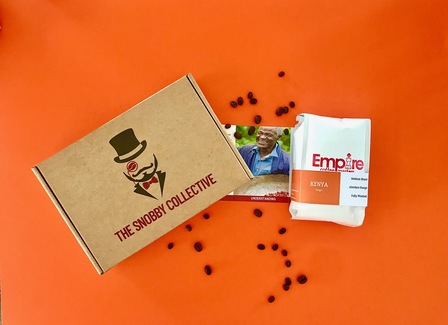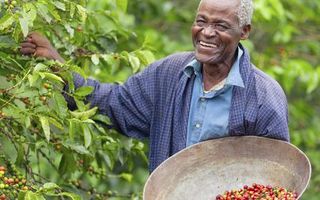March 2020
Feature #16
Our collaboration with Empire Coffee Roasters is our second time featuring Kenya, an origin that is somewhat of an enigma when it comes to transparency. This particular coffee was the perfect opportunity to investigate why, something that we did with the help of green been importers,John Burton Ltd, from whom Empire Coffee Roasters sourced this Kenya AB.
During March we explored:
KENYA – AN OVER VIEW:
The coffee industry in Kenya employs more than 6 million people, is home to about 800,000 small lot farmers who have affiliations to approximately 500 cooperative societies. All of whom rely upon the fruits of 4000 coffee plantations for their income. Kenya does many things differently to other origins, some by design that dates back to colonial times when coffee was introduced. One notable difference is the grading and coding of Kenyan coffee, from AA – PB (pea berry) largest to smallest, coffee is graded by size (screen) shape, colour and density. The general assumption that the larger the bean, the more essential oils they contain and therefore more flavour and aroma. The trading of coffee in Kenya also differs significantly to many other origins and as a result make transparency much harder throughout the value chain. Coffee is sold through through one of two channels by approximately 50 licensed exporters or dealers. At auction, held at the Nairobi Coffee Exchange (NCE) or via direct trade. Both are ultimately underpinned by the Kenyan coffee board requirements and regulations
SELLING ( AUCTION)
For coffee sent to be auctioned at the NCE, the marketing agent remains responsible for the coffee throughout the process, including auctioning of coffee on auction day and the preparation of invoices following the auction. Pre - sale preparation involves the marketing agent collecting and arranging samples for dealers and potential buyers. NCE coffee auctions start on the first of October every year and continue for 9 months while green coffee beans are available. Approximately 80 percent of Kenyan coffee is sold via auction, making it by and large the preferred method for marketers. Once the coffee has been sold via the NCE auction, payment is made to the marketing agent within seven days. Proceeds are then distributed to growers with the statutory charges, milling costs and outstanding loans deducted. Following receipt of the payment, the marketing agent then arranges for the transfer of ownership of coffee and the exporter takes ownership from the warehouse and undertakes any pre export requirement laid out by the buyer specifications. This may include verification against pre auction samples, re grading or even additional processing.
SELLING (SECOND WINDOW)
Direct trade, often referred to as second window selling in Kenya, is also the domain of the marketing agent. Through direct trade, coffee is sold directly to an overseas buyer with the negotiations taking place between the marketing agent and buyer, once a contract has been signed it is then registered with the coffee board of Kenya. Direct trade opens doors for traceability and communication throughout the value chain, but the side effect of this is the doors it subsequently closes for producers. Similar to an exporter / dealer, for a farmer or producer to sell directly they must posses a grower/marketer license, which then allows them to sell and receive payment for the coffee. Limitations of this license are that it is an all or nothing deal. Holders of grower / marketer licenses are not allowed to sell their coffee through the NCE auctions, meaning they must find a buyer for their full harvest through direct trading channels. In addition to the challenges of finding a buyer/s for the entire harvest, there is a cost to the license and a requirement that it be renewed annually. Unlike at auction, direct trade also requires farmers or Co-Ops to handle many logistics from documentation and licensing depending on the destination country, to getting the coffee to the Port of Mombusa. Transportation is by road or rail. Due to limited resources and lack of experience, most co-operatives opt to sell their coffee via the NCE.
TASTING NOTES
Country: Kenya
Region:Aberdare Range
Grade: AB
M.A.S.L: 1500 – 2100m
Flavour notes: Dark Cacao, Blackberry, Plum, Cracked Pepper.
Click here for a brief history of Kenyan coffee and more from our December 2019 Collaboration
RECIPE
Recommended method: Aeropress (Inverted)
22g ground coffee 50g Bloom for 30 seconds
(stir for even saturation) 150g Pour (total 200g)
Steep until 1 minute 15 seconds Plunge for 45 seconds (2 min contact total) Add 100g hot water to brewed coffee and stir.
Come with us as we show you how to brew this coffee with the Aeropress.
|
© Copyright Derelict Coffee Roasters |


